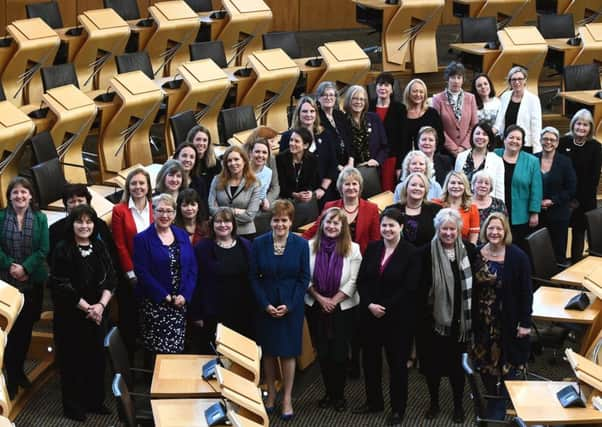Campaigners call for law to boost female political representation


A century on from the landmark 1918 act that first granted women the vote, a minority of Scotland’s elected representatives - MPs, MSPs and councillors - are female.
Despite making up 52 per cent of the population women only account for 35 per cent of Holyrood members and 29 per cent of the more than 1,000 elected councillors north of the Border.
Advertisement
Hide AdAdvertisement
Hide AdWhile there have been some improvements - the number of women on local authorities rose five per cent at the 2017 election - campaigners are calling for a new law to ensure major parties are more proactive in recruiting female candidates.
“It’s not surprising the number is so low when we know the impact of institutionalised inequalities,” said Talat Yaqoob, co-founder of Women 50-50. “While we have sexism in the media, poor childcare, and the majority of care work being done by women, the number will remain low.
“What Women 50-50 is fighting for is to have candidate quotas in place, so at least 50 per cent of candidates put forward by a party - whether in a council or a parliamentary election - would have to be women.
“What this means is political parties have to go a lot further in looking at their own institutionalised inequalities. This would require some real outreach to actively encourage women to join and help them advance.”
Yaqoob agrees that a lack of female representation at council level remains a stubbornly low across Scotland.
“There are more than 100 wards with no female representation,” she added. “Part of the problem is the culture we have within councils. Many councillors are part-time and require another job on top of that. If you add in unpaid care, or caring responsibilites, that’s a lot for women to carry.
“But there was an increase in women councillors at the last election - unlike at Holyrood, which reached a peak during the 2003-2007 parliamentary term when 40 per cent of MSPs were women. This illustrates that progress isn’t linear and why we need legislation for candidate quotas.”
Lothians MSP Kezia Dugdale, leader of Scottish Labour from 2015-2017, is a co-founder of Women 50:50.
Advertisement
Hide AdAdvertisement
Hide Ad“A century on from some women receiving the vote for the first time, women remain underrepresented in positions of influence in Scotland, giving them unequal access to power, decision-making and participation throughout public life,” she told The Scotsman, “That has to change.
“There have been a number of advances in recent months, including the passing of a law that will set targets for gender balance on public boards, and it is welcome that the Scottish Parliamentary Corporate Body is no longer an all-male domain. But the gender imbalance in our parliaments and local authorities still needs to be tackled.
“I urge all parties to make further progress, particularly at local authority level, because we can’t wait 100 more years for gender equality. I want it now and I will strive for it with every breath of my working life, because it remains a cause of natural justice and the block to economic progress.”
Last month Holyrood passed a law to ensure women make up at least half the board members for all public authorities by 2022.
The Scottish Parliament voted by 88 to 28 in favour of the Gender Representation on Public Boards (Scotland) Bill, with opposition from the Conservatives.
“It’s a step in the right direction and shows there are resources to bring women into the political sphere,” added Yaqoob. “But it’s not going push political parties to go further. That’s why we need legislative change as it is the only way for this to be taken seriously.”
